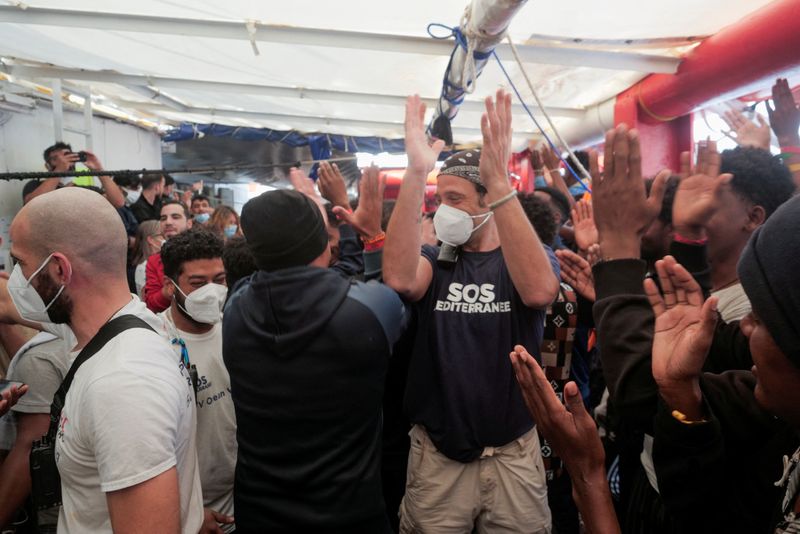By Federico Maccioni
MILAN (Reuters) - Italian Prime Minister Giorgia Meloni is cracking down on charity rescue boats operating in the Mediterranean, accusing them of acting as a de facto taxi service for migrants.
Her uncompromising stance has sparked a diplomatic row with Paris after one of the non-governmental (NGO) boats, which had been refused access to an Italian port, headed instead to France to disembark some 230 migrants.
France and the NGOs have accused Italy of breaking international maritime law by denying the ships safe refuge. Meloni's right-wing government denies this.
Here is a breakdown of the legal framework that regulates rescues at sea and some of the issues at play.
WHAT LAWS REGULATE SEA SEARCH AND RESCUE OPERATIONS?
Article 98 of the United Nations Convention on the Law of the Sea (UNCLOS) says every state must require ships flying their flag to "render assistance to any person found at sea in danger of being lost".
The International Convention on Maritime Search and Rescue (SAR) requires signatory countries to set up often huge "SAR" areas beyond their own territorial waters, which extend for up to 12 nautical miles from the shoreline.
HOW DO SAR OPERATIONS WORK?
Activities within each SAR zone are overseen by national Maritime Rescue Coordination Centres (MRCC).
According to the UNCLOS, rescues are only considered complete once those picked up at sea are disembarked at a "place of safety". The international SAR convention defines this as anywhere peoples' lives are not threatened and their basic needs can be met.
WHY IS ITALY AT THE CENTRE OF THE STORM?
Many of the NGO rescues take place in SAR zones assigned to war-ravaged Libya and Malta, the EU's smallest nation.
Malta has repeatedly refused to take in migrants, pointing to its limited size and facilities. The U.N. refugee agency (UNHCR) says Libya cannot be considered a "place of safety" for multiple reasons, including systematic human rights abuses.
The North African state Tunisia is often the closest third nation, but Giuseppe Cataldi, who teaches International Law at Napoli l'Orientale University, says it is not an eligible place of safety because it has no asylum framework to guarantee that applicants are not sent back to their origin countries.
Charity rescue ships therefore automatically head to Italy.
SO WHAT HAS CHANGED NOW?
Meloni's right-wing coalition allies vowed to crack down on illegal immigration ahead of September elections. When they took power last month, they told NGO boats that Italy could no longer be the default country for disembarkations.
On Oct. 25, Interior Minister Matteo Piantedosi suggested Italy might ban charity ships from entering territorial waters based on Article 19 of UNCLOS, which says arriving ships must not be "prejudicial to the peace, good order or security of the coastal State".
The NGOs all rejected this interpretation of the law. Legal expert Cataldi said denying or delaying access to Italian waters by citing illegal immigration represented a violation of international law as it prevented boats from carrying out disembarkation operations in a timely fashion.
THE ROLE OF FLAGGED NATIONS
On Nov. 2, Meloni said the flag states of the NGO ships were responsible for the migrants who had been rescued - in this case Norway and Germany. Piantedosi described the ships as "islands", or de facto territorial extensions of the flag nation.
NGOs, Germany, Norway and legal experts reject this.
Christopher Hein, who teaches Law and Policy on Immigration and Asylum at Rome's LUISS University, says flag nations are not responsible for disembarkation or asylum.

Hein and Cataldi also rejected Rome's suggestion that the ships be considered a place of safety or that asylum requests could be processed aboard the vessels, saying the law was clear that "a ship is not a territory".
(This story has been refiled to clarify final paragraph)